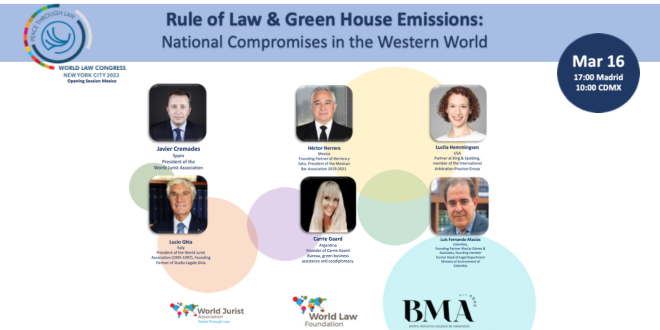On March 16, 2023, the World Jurist Association (WJA) held the Opening Session Mexico of the upcoming World Law Congress New York 2023. The conference took place within the framework of the WJA’s Energy and Climate Transition Forum.
Under the title “Rule of Law and Greenhouse Gas Emissions: National Commitments in the Western World“, the panel addressed relevant legal aspects of the energy transition, with a focus on Nationally Determined Contributions for the reduction of greenhouse gases. The panel also discussed the importance of the energy transition as a necessary tool to improve air quality; the need to migrate from fossil fuels to cleaner energy sources; and the key role of the Rule of Law in this process.
The Opening Session Mexico was moderated by Héctor Herrera, Founding Partner of Herrera y Sato and President of the Mexican Bar Association (2019-2021). Rule of Law, key to curbing humankind effects on the environment.
Javier Cremades, President of the World Jurist Association, was in charge of opening the meeting, highlighting the importance of the Rule of Law to guarantee a global response to the great challenge that humanity is currently facing with emission levels.
Subsequently, Héctor Herrera (Mexico), explained how greenhouse gas emissions affect all countries in the world, stressing the importance of complying with the Nationally Determined Contributions to reduce them. “This is a global emergency that needs coordinated solutions,” he said.
Carrie Gaard (Argentina), Founder of Carrie Gaard Bureau, an expert in environmental management, made an analysis of how in the last century gas emissions have been gradually increasing, calling for the need to take actions in which all countries are involved. Gaard also stated that current objectives and policies are insufficient to achieve the goals set to curb climate change.
Lucila (Luli) Hemmingsen (USA), Partner at King & Spalding, and member of the International Arbitration Practice Group, referred to the situation in the United States, the second largest energy consumer in the world. Hemmingsen explained that the U.S. is far from achieving its environmental goals. “Current U.S. policies will only reach 20-30% of its Nationally Determined Contribution by 2025,” she warned. Adding, furthermore, that to reach its commitments, additional regulation and healthier economic development are urgently needed.
Lucio Ghia (Italy), President of the World Association of Jurists (1995-1997) and Founding Partner of Studio Legale Ghia, also participated in this meeting, highlighting that “climate change represents a threat to humanity that requires a comprehensive ecological policy, in which companies are also involved”. He also explained how environmental policy affects human and business activities, and highlighted how the law can become an incentive for companies to take measures to reduce their carbon footprint, offering them in return credit benefits, for example.
Meanwhile, Luis Fernando Macías (Colombia), Founding Partner of Macías Gómez & Asociados, founding member and former Head of the Legal Office of the Colombian Ministry of Environment, assured that “climate change represents a challenge for the Rule of Law because of the effects it has, especially in poor countries, such as Colombia, which find it difficult to comply with the objectives of the Paris Agreement”. In addition, Macías clarified how many aspects of our lives are a consequence of climate change and, therefore, there is a need to rely on the Rule of Law and democracy to control and mitigate this situation.
Diego Solana (Spain), International Advisor of the World Law Foundation and Program Coordinator of the World Law Congress, oversaw the closing of the Opening Session Mexico. He emphasized the importance of holding such debates, which will continue at the World Law Congress New York 2023, to be held on July 20 and 21.
He also announced the opening of registration at the World Law Congress New York 2023 to professionals, activists, and students around the world, through the website www.worldlawcongress.com and invited everyone to participate in this major global legal meeting. In addition to environmental and energy law issues, topics such as freedom of expression in the digital world, the regulation of stable cryptocurrencies, judicial independence, gender equality, and arbitration, among many others, will be addressed at the Congress.

